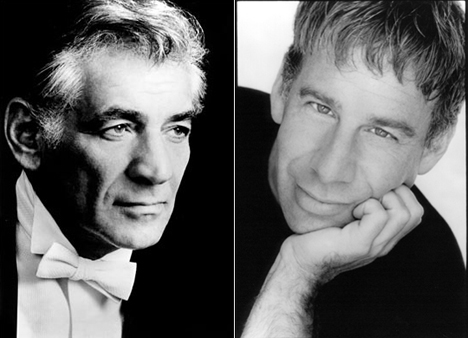
The New York State Theater -- recently renovated and renamed the David H. Koch Theater in the wake of a $100 million gift from that billionaire philanthropist -- has been known primarily as a home for ballet and opera since it opened in 1964, but the venue also has an honored history of American musical theater productions. In its early years, the Music Theater of Lincoln Center under the leadership of no less than Richard Rodgers offered acclaimed stagings of several beloved shows there, including Rodgers' own South Pacific and The King and I plus such other classics as West Side Story and Kismet, not to mention a smash-hit revival of Annie Get Your Gun with the one and only Ethel Merman recreating her original role.
Over the years, the theater's two resident companies, New York City Opera and New York City Ballet, have each done their part to blur the lines between the various art forms: NYCB has often revived Fancy Free, the Bernstein-Jerome Robbins ballet that served as the basis for the musical On the Town, as well as the popular West Side Story suite of dances; and NYCO's musicals have ranged from Sweeney Todd to 110 in the Shade to The Pajama Game.
All of which is meant to make the point that City Opera's 2010-2011 season, dedicated largely to the music of Leonard Bernstein and Stephen Schwartz, is part of a grand tradition. Beginning tonight (October 27), the company revives Bernstein's only full-length opera, A Quiet Place; and on Saturday, November 6, a starry gala celebration titled Leonard Bernstein: Lucky to Be Me will pack the theater. In April-May, NYCO will give us the New York premiere production of Schwartz's first opera, Séance on a Wet Afternoon; and on April 21, the company will field another starry concert, this one titled Defying Gravity: The Music of Stephen Schwartz. I recently spoke with George Steel, NYCO's new general manager and artistic director, about all this excitement.
********************
BROADWAYSTARS: The State Theater, now the Koch, is a large hall with about 2,700 seats. The general opinion is that some musicals have worked beautifully there, whereas more intimate works have not. What are some of the pluses of presenting musical theater in this venue?
GEORGE STEEL: Well, for one thing, New York City Opera is able to field an orchestra of a size that you'll never hear on Broadway. That's a wonderful experience for the right kind of music. Also, depending on the show, we can present it unmiked, as will be the case with both A Quiet Place and Séance on a Wet Afternoon. There's a kid in the Schwartz opera who may get a little reinforcement, and there's a jazz trio in the Trouble in Tahiti section of the Bernstein that's supposed to be miked, but for the most part, those performances will be acoustic. In the Bernstein and Schwartz concerts, the show music will be sung on mike by the Broadway people.
STARS: Can you give us an update on the guest stars for the Bernstein concert?
STEEL: We have Victoria Clark, Christine Ebersole, Kelli O'Hara, Donna Murphy, Michael Cerveris, Darius de Haas, Cheyenne Jackson, and Michael Urie, plus some of our own best singers, our chorus and children's choir, the Brooklyn Youth Chorus, and of course, the New York City Opera orchestra. It's an enormous show. We'll be doing music from Wonderful Town, 1600 Pennsylvania Avenue, On the Town, West Side Story, and more, as well as sections of the Kaddish Symphony, Mass, and Songfest. Ted Sperling is directing the show, and George Manahan will conduct.
STARS: You brought up the subject of orchestral forces. There has been such a marked diminution in the size of Broadway orchestras over the past few decades...
STEEL: Yes, it's heartbreaking. When I see a musical on Broadway with nine or ten musicians and someone asks "Who orchestrated this show?", I always say, "The producers."
STARS: Do you think there will always be a market for enjoyment of full orchestras at places like City Opera and the Met?
STEEL: Absolutely. That's what we're in the business of doing. And it's the first thing we do, not an add-on. When you're focusing on musical values, you cannot synthesize or replace a real orchestra. But the answer may be that, in the future, really top-flight orchestra playing will thrive in the not-for-profit sphere, because in the commercial theater, the money is being spent elsewhere; it seems you can have A and B but not C, or A and C but not B. You can't have all three.
STARS: Do you think that musicals will continue to have a place in the New York City Opera repertoire?
STEEL: Yes!
STARS: You know, the Tonys are looking for a new venue, now that Radio City Music Hall is unavailable....
STEEL: They should absolutely come to Lincoln Center. That's a great idea.
STARS: Bernstein's A Quiet Place was not well received in its premiere production by the Houston Grand Opera, but maybe it's time for a reassessment.
STEEL: It takes my breath away to think that people can come to our theater and hear three hours of a Bernstein opera that has never been done in New York. What an astonishing gift that is. The score is beautiful. It's not Broadway; it's opera. But it's extraordinarily wonderful music.
STARS: Would you care to speculate on why the opera wasn't successful when it premiered?
STEEL: It's not hard to imagine that in Houston, Texas during the Reagan '80s, people were not ready for an opera about a dysfunctional family with a gay main character. Also, it was the curse of Leonard Bernstein that a lot of people came to his works with an expectation of what they were supposed to sound like, and were irate when they heard something else. You know, "I came for West Side Story, and what I got was art music." It was incredibly courageous of Bernstein to stick to his guns and produce the music he believed in very deeply. He didn't pander. That's the sign of a truly great artist.
STARS: As for the Stephen Schwartz opera, what are your thoughts?
STEEL: What's amazing is how well he adapted to the operatic idiom. It's a very strong piece with a great story. And it's appropriate that it will bookend our season with the Bernstein opera, because one of Stephen Schwartz's first gigs out of college was to work with Bernstein on Mass. Also, Bernstein's sister Shirley was Schwartz's agent for many years, so they had a long-standing relationship.
STARS: I didn't get to NYCO at all last season, so I haven't been in the theater since the renovation. I'm excited to see and hear what's been done.
STEEL: I think there's sort of a canard or a myth in the public mind that the theater was built for dance and therefore can't be good for opera, which is just nonsense. The great thing about the stage for dance is that it has a permanently installed, sprung dance floor, so the noise of footfalls isn't created in the first place. I think what really happened is that the theater was actually too reverberant when it opened -- they were doing spoken theater here, as well as musicals -- so they put in all this stuff to dry up the sound, including floor-to-ceiling carpet on the back wall. We've finally torn out the carpet and fixed the place up. Now it sounds wonderful.
[For more information about the New York City Opera season, or to purchase tickets, visit nycopera.com]




